Record in mortgage lending for the third consecutive quarter
28 October 2021 - 10 min Reading time
In the third quarter of 2021, nearly 68,500 mortgage loan agreements were concluded for a total amount of 11 billion EUR (excluding refinancing).
This represents an increase in the number of granted loan agreements by approximately 18.5% compared to the third quarter of the previous year. In terms of the loan amount, slightly less than 32.5% more credit was granted than during that period.
It should be noted that the third quarter of 2020 was also a relatively weak quarter in terms of granted loan agreements due to the COVID-19 pandemic and the associated lockdown during the second quarter.
A comparison with the more "normal" third quarter of 2019 reveals that in the past quarter, although slightly fewer loans were granted (-1.6%) than in that period, the loan amounts were significantly higher (+17%).
Excluding refinancing, the number of credit applications in the third quarter of 2021 decreased by approximately 17% compared to the third quarter of 2020. This third quarter of 2020 followed right after the lockdown, which allowed credit applications to increase significantly at that time. In terms of the loan amount, there was also a decrease of about 12.5%.
These statistics are based on mortgage credit data published today by the Professional Association of Credit (BVK/UPC).
The 54 members of the BVK collectively account for approximately 90% of the total number of newly granted mortgage loans (referred to as production). The total outstanding amount of mortgage credit held by BVK members was approximately 254 billion EUR at the end of September 2021.
Mortgage lending has fully recovered
After two previous exceptionally strong quarters, the third quarter of 2021 saw a record amount of mortgage lending once again.
Interest rates for mortgage loans remained very attractive in the past quarter as well. According to figures published by the National Bank of Belgium, in August, these rates ranged from 1.36% (for loans with a fixed interest rate and an initial period of interest rate stability of more than 5 years and up to 10 years) to 2.09% (for loans with an initial fixed interest rate period of more than 1 year and up to 5 years).
Below, you will find the key findings for the third quarter of 2021 compared to the third quarter of 2020:
These figures do not take refinancing into account.
- The number of credit applications (excluding refinancing) decreased by 17% in the third quarter of 2021 compared to the third quarter of 2020. There was also a decrease of nearly 10% compared to the third quarter of 2019. The amount of credit applications also decreased by approximately 12.5% compared to 2020, but it is still nearly 7% higher than in 2019. Thus, nearly 87,000 credit applications were submitted for a total amount of 15 billion EUR.
- The number of granted mortgage loans increased by approximately 18.5% in the third quarter of 2021 compared to the same period last year. Compared to the third quarter of 2019, there was a slight decrease of 1.5%. The corresponding amount increased by about 32.5% compared to 2020. Also, compared to 2019, there is still an increase of almost 17%. In total, nearly 68,500 loans were granted for a total amount of 11 billion EUR (excluding refinancing).
- The number of loans for the construction of a house saw the strongest percentage increase in the third quarter, with +38.5% or 2,712 more loans than in the third quarter of 2020, along with the number of loans for the purchase of a house (+6,713, or +22.7%). The number of loans for purchase with renovation (+514) increased by almost 20%, while the number of loans for home renovation (+885) increased by 6%. The number of loans for other purposes (-164, or -3.6%) saw a slight decrease compared to the third quarter of 2020.
- The number of external refinancings (+704, or +7.5%) continued to increase in the third quarter of 2021, although to a lesser extent than before. In the third quarter of 2021, slightly more than 10,000 external refinancings were granted for just over 1.3 billion EUR.
- The average amount for a construction loan continued to increase in the third quarter of 2021 to 208,000 EUR. This is an increase of 40,000 EUR (or 23.5%) since early 2019. The average amount of loans for purchase + renovation also experienced a significant increase to nearly 218,000 EUR.
- The average borrowed amount for home purchase increased again to 188,500 EUR in the third quarter of 2021.
- In the third quarter of 2021, more than 9 out of 10 borrowers once again opted for a fixed interest rate or a variable interest rate with an initial fixed interest period of at least 10 years. In less than 0.5% of cases, borrowers still chose a loan with an annually variable interest rate.
Hypothecary credit lending continues to mirror the strong surge in the real estate market activity. Never before has so much mortgage credit been granted in the third quarter. The two previous quarters were also exceptionally high. However, we have noticed a slight decline in the number of credit applications in recent months.
I. Number of loan applications
The number of loan applications, excluding those related to external refinancing, experienced a decrease of 17% during the third quarter of 2021 compared to the same quarter last year. The underlying amount of loan applications also decreased by 12.5%.
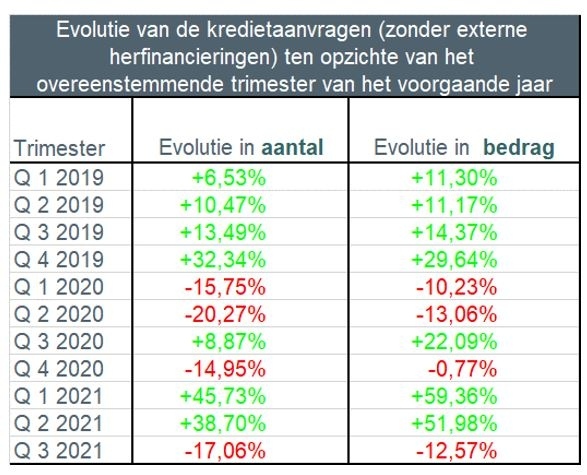
The number of loan applications decreased for all purposes. Loan applications for the purchase of a home (-11,005) decreased by 18%, those for the purchase + renovation of a home (-1,249) by 19%. The number of loan applications for home renovation (-3,651, or -19%), as well as loan applications for other purposes such as a garage, building land... (-1,710, or -24%), also experienced a significant decrease. There was only a slight decrease in the number of loan applications for home construction (-242, or -2%). Loan applications for external refinancing also saw a sharp decline of 35%.
Garage, bouwgrond, …
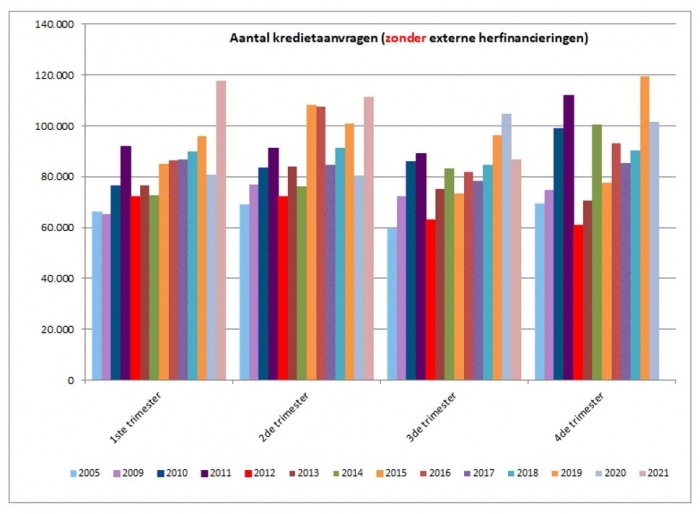
II. Number of loans granted in the third quarter
In the third quarter of 2021, the number of granted loans, excluding external refinancing, increased by 18.5% compared to the third quarter of 2020. The corresponding amount increased by 32.5%.
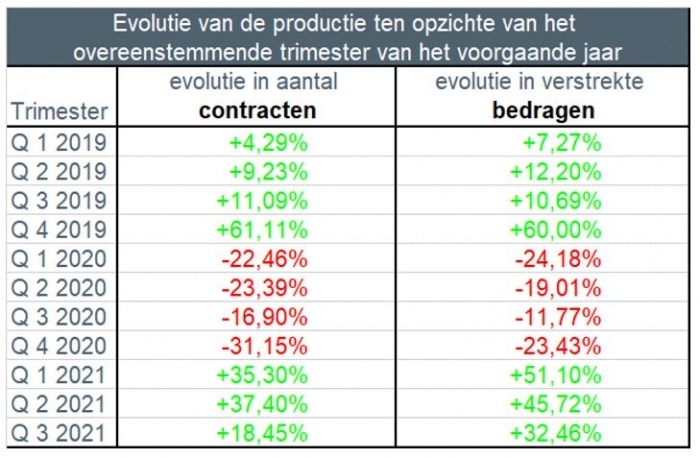
Never before has so much mortgage credit been granted in a third quarter.
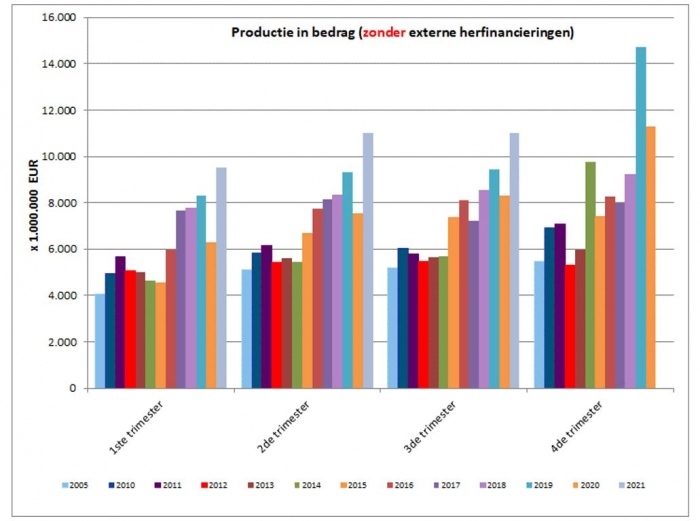
III. Increase in the number of loans for almost all purposes
In the third quarter of 2021, nearly 68,500 new loans were granted for a total amount of approximately 11 billion EUR, excluding external refinancing.
Compared to the third quarter of the previous year, an increase was observed for almost all purposes.
The number of loans for home purchases (+6,713) in the third quarter of 2021 was nearly 23% higher than in the third quarter of 2020. The number of loans for purchase with renovation (+514) increased by almost 20%, while the number of construction loans (+2,712) was 38.5% higher. The number of loans for other purposes (-164) was the only one to experience a slight decrease of 3.5%. The number of loans for home renovation showed a modest increase, namely +6.3% or 885 more loans than in the third quarter of 2020.
Furthermore, in the third quarter of 2021, the number of external refinancing loans continued to increase by 7.5%. More specifically, just over 10,000 external refinancing loans were granted for a total amount of nearly 1.3 billion EUR.
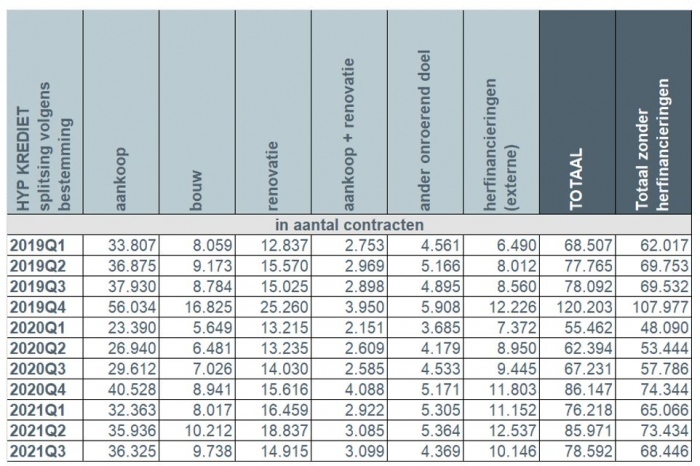
IV. Average loan amount for home construction increases by 40,000 EUR in less than three years
The average loan amount for home construction saw a further increase in the third quarter of 2021, reaching 208,000 EUR. This represents an increase of approximately 40,000 EUR (or 23.5%) since the beginning of 2019.
The average loan amount for the purchase of a home + renovation experienced a significant increase in the third quarter, reaching nearly 218,000 EUR. However, this is still an increase of "only" about 23,000 EUR (or 12%) since the beginning of 2019.
The average loan amount for the purchase of a home also saw an increase in the third quarter of 2021, totaling just over 188,000 EUR. This is another increase of 29,000 EUR (or more than 18%) compared to the beginning of 2019.
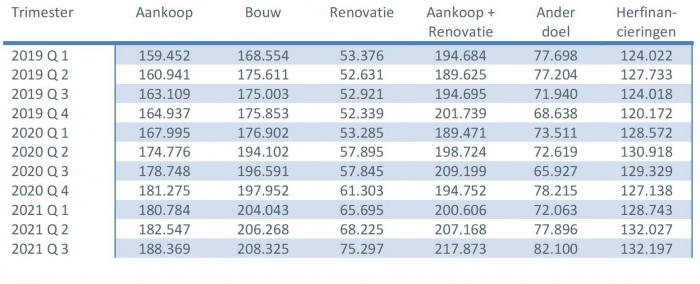
V. More than 9 out of 10 borrowers opt for a fixed interest rate
In the third quarter of 2021, once again, more than 9 out of 10 borrowers (92.9%) chose either a fixed interest rate or a variable interest rate with an initial fixed-rate period of at least 10 years. Just over 6.5% of borrowers opted for a variable interest rate with an initial fixed-rate period between 3 and 10 years. The number of borrowers opting for an annually variable interest rate is less than 0.5%.
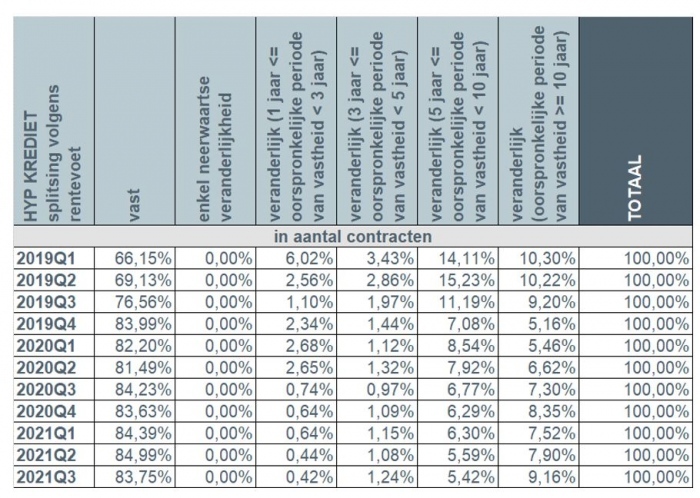
Taking into account the still very low interest rates (see chart below), the Belgian consumer continues to overwhelmingly choose security. The number of individuals opting for a variable interest rate remains low, especially in the case of an annually variable interest rate. However, even in the case of a variable interest rate, consumers are highly protected by legislation. For instance, after adjusting to changes in the applicable reference indices, the variable interest rate can never exceed twice the initial interest rate.
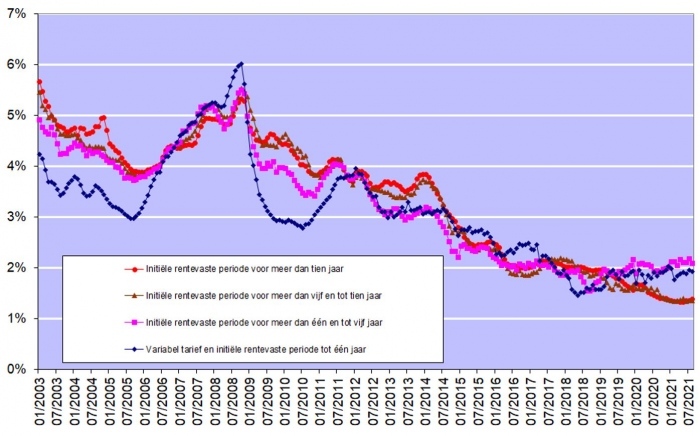
Responsible mortgage lending remains the foundation
The credit sector is and remains aware that mortgage lending must be carried out with great care, and responsible lending should remain the absolute cornerstone. In this regard, the sector aligns with the regulator: credit providers must exercise the necessary caution to, on the one hand, minimize the risk of individual borrowers taking on overly large loans and, on the other hand, safeguard financial stability in the long term.
